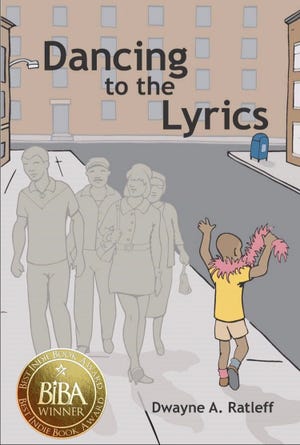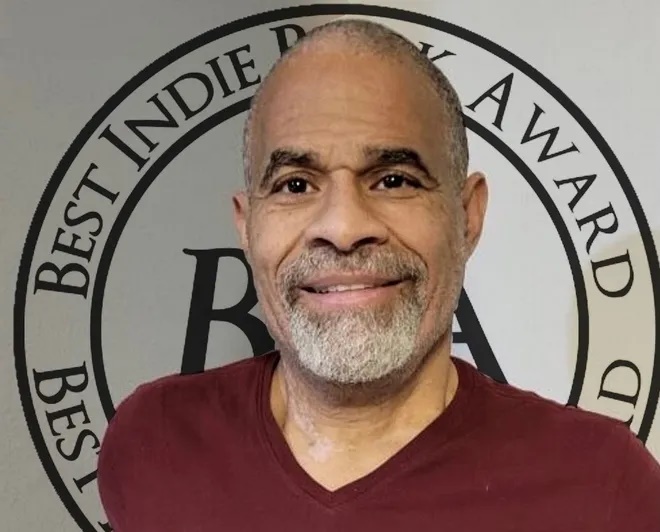Greg Archer – Special to The Desert Sun
Martin Luther King Jr. once said, “Darkness cannot drive out darkness, only light can do that.” In many ways, Palm Desert resident Dwayne A. Ratleff has taken that principle to heart.
The upbeat local author possesses a light — both personal and creative — that radiates throughout his book “Dancing to the Lyrics: Finding an Inner Rhythm,” which garnered a Best Indie Book Award for 2021. The compelling read chronicles a curious African American boy who finds emotional footing during the political upheavals and racial injustices of the 1960s.
Although Ratleff listed the book as fiction, in many ways it’s a memoir.
“It may be about a gay Black child, but the funny thing is, that’s not really what it’s about,” he says. “That’s the surface. At its core, it’s a very human book.”
Hence that subtitle, “Finding an Inner Rhythm.”
“I lived through the riots and so much more,” says Ratleff who will turn 63 on March 22. “Most kids in America, particularly white kids, don’t see soldiers marching down the streets with bayonets or your city burning — like what’s going on in Ukraine today. For most people, that’s something other-worldly, but it wasn’t for me. I wanted to write a book that captured that but that was also about evolving. We change all the time.”
Ratleff, the oldest of three children, surfed through life’s challenges — and other, personally haunting ones — with a rare kind of grace.
“There was so much going on back then, but I was a happy child,” he’s quick to point out. “I lived between the Maryland Penitentiary and a junkyard. When we opened the back door, and I saw that junkyard — oh my God, a boy and a junkyard? I loved it. When I finally went to a real playground and I saw swings and slides, I was like, ‘What is this? This is so boring.'”
Ratleff and sisters found a dead man in that junkyard, in fact. He was about 6 at the time.
In some ways, he says those experiences made him a “very advanced” child because “I knew what was going on.” In particular, he points out the physical abuse he and his mother endured from his stepfather. “His behavior was so horrendous that I knew it didn’t have anything to do with me. I learned at an early age that I had to get out of that house.”
And in other ways, Ratleff was just a boy finding his way.
Martin Luther King Jr. was killed on Ratleff’s mother’s birthday, April 4, 1968. “We turned out the lights to blow out the candles on the cake,” he says. “The TV was still on, and when my mother blew out the candles, Walter Cronkite came on TV and said that Martin Luther King Jr. had been killed. As a kid, I thought, ‘Oh my God, my mother blew out his life.'”

Beyond world events, Ratleff knew at a young age that he was different.
“I didn’t know I was ‘gay,'” he says. “I didn’t know what it was. I did know something though. Black was evident. That’s just what it was, and at a very early age I realized that my country hated my guts. I decided, ‘I’m not going to do that.'”
To himself. Or others.
There’s also some irony in the fact that Ratleff wrote and published a book at all — for several reasons.
He was a former special ed student who didn’t learn to read or write until the age of 10. “I always thought I was a consumer of words, not a producer,” he says. “I was always afraid of my writing — always.”
However, something within him became unleashed in summer school. Suddenly, Ratleff advanced far beyond where he’d thought he’d ever go, and when his family moved to Connecticut, he found himself surrounded by some of the best schools in the country.
Other obstacles emerged later in life, making “Dancing to the Lyrics” somewhat of an astonishing feat. In 2012, Ratleff fell through a glass window and partially severed his left hand. He couldn’t type. But he felt called to write a book. So, he resorted to typing the manuscript — using just one finger.
A mighty finger it was.
Ratleff’s coming-of-age tale introduces readers to Grant Cole, a gay African American youth who braves personal and cultural obstacles as he learns to navigate through a great deal of unrest — from the Baltimore riots and Vietnam War protests to poverty, crime and the assassinations of King and Robert F. Kennedy.
Ratleff keeps the book strictly anchored in Cole’s childhood, illuminating his protagonist’s vivid imagination and bond with his younger sisters and various family members. Eventually, they become a saving grace. Lessons of faith and level-headedness emerge — key to overcoming adversity in the 1960s, sure, but the author offers a new lens from which readers can view current events.
Prior to moving to the desert where many of his friends had already settled, Ratleff ran his own house cleaning business. “It was the easiest way to be my own boss,” he says. “I was very selective about who I took on as clients. I didn’t care how messy your house was, as long as you didn’t have a messy personality.”
Now that he’s in his 60s, would Ratleff, who’s also been a long-term HIV survivor, ever consider writing a tale about his own adult experiences?
“I was diagnosed with HIV 40 years ago,” he says. “But it’s a heavy pen to lift right now. Although I think I’d like to write about it, because so many people are survivors. It really changed my life. And it sounds funny, but HIV has been a blessing for me. As awful as it was, it really gave me the catalyst to live life. I was told I would most likely be sick in three years and dead in five.”
When asked what he believes pulled him through the challenges — all of them — Ratleff refers to, in part, the words he wrote for the book’s dedication page.
“In a world of self-made men, I am not one, I was made by many,” he recites. “My every breath is a ‘thank you’ to those who have helped me build the emotional infrastructure to thrive. I would like to [also] thank those who I often have mistakenly cursed. The ones who’ve placed obstacles in my path and threw adversity in my face. They were the fire that transformed me into iron.”
Greg Archer writes about change agents, happenstance, and the entertainment industry. His work has appeared in the USA Today Network, Palm Springs Life, Huffington Post, The Advocate, and other media outlets. His memoir, “Grace Revealed,” chronicles his Polish family’s odyssey during World War II. gregarcher.com

